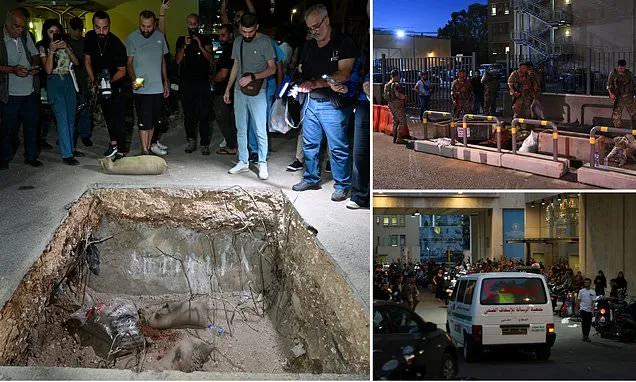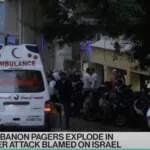(Daily Mail) Thousands of walkie-talkies, solar panels and fingerprint recognition devices used by Hezbollah fighters have detonated across Lebanon in the past two days, killing 14 and wounding hundreds of people including mourners at a funeral.
The second wave of carnage hit a day after thousands of exploding pagers used by the group left almost 3,000 people injured and a dozen dead, including civilians and children.
Security sources confirmed that hand-held radios were purchased by Hezbollah five months ago, at around the same time as compromised pagers. Lebanese media has also reported that home solar energy systems have blown up in several areas of Beirut.
The ensuing panic has caused terrified residents to tear the batteries from their walkie-talkies and throw devices into the street in fear of more explosions.
But how do you live if you don’t know where the next blasts might come from?
Here, local journalist HASSAN HARFOUSH describes how daily life has turned into a horror film.
Now it had started again. Two distinct pops, we heard, one coming from the ambulance that I assumed had brought the coffins to the funeral.
I saw a paramedic stumbling out of the vehicle which was billowing smoke. He collapsed and people rushed to help, but I was too far away to see how badly injured he was.

A walkie-talkie that was exploded inside a house, in Baalbek, east Lebanon today


The second wave of carnage comes a day after thousands of exploding pagers used by the group left almost 3,000 people injured and a dozen dead, including civilians and children

Ambulances arrive after a reported device explosion occurred during the funeral of people killed when hundreds of paging devices exploded in a deadly wave across Lebanon

A man bleeding after his pager exploded in Beirut, Lebanon

A fire breaking out in a car as a result of a device exploding in Lebanon
The Hezbollah officials present behaved as if nothing had happened but all of us felt it, heard it. We knew another attack was underway, though only later did we discover it was walkie-talkies and radios exploding this time.
As a journalist based in Lebanon, I have covered any number of conflicts and seen too many dead bodies. But nothing prepared me for the fear and carnage wrought by the events of the last two days.
Beirut has collapsed into panic. The WhatsApp groups are going non-stop. There are wild rumours doing the rounds that solar panels might explode, batteries, fridges – anything. There’s fake news saying phones have exploded. I know it’s stupid but I even told my parents to get a fire extinguisher, just in case something blows up in the house.
We’re all really scared; there is no safe place any more. Everyone knows what these explosions can do. In a Beirut hospital, I saw a man whose flesh had been torn from his face, the bones gruesomely visible. He was still conscious.
Doctors told me that faces and hands were the worst areas of injury.

A man holds a walkie talkie device after he removed the battery during the funeral of persons killed when hundreds of paging devices exploded in a deadly wave

People donate blood, one day after pagers explosions, in the southern suburb of Beirut

Lebanese army soldiers stand guard near a fire truck at the scene of a reported pager device explosion in Saida in southern Lebanon

Lebanese soldiers taking precautions in the area after a new wave of wireless communications device explosions
Untold numbers have lost their eyesight as people were holding up the pagers to read messages when they exploded.
I was in a coffee shop on Tuesday afternoon in Ras Beirut, in the north west of the city, when I first realised something was wrong. I heard three pops, one after the other. Then my phone started going crazy. People were messaging me to ask what had happened, worried friends and family were calling.
My brother called to tell me he had heard lots of explosions and that the American University Medical Centre was overwhelmed. Most of the injured had been referred from other hospitals because of the extent of their wounds.
Outside, family members, barred from entry because of security, were crying and in shock. I watched dozens of people walk into the hospital with missing limbs. I saw people whose eyes had been popped out of their sockets. The scene was apocalyptic. The National, a leading newspaper here, spoke to a woman called Amal, who was waiting for news of her brother and cousins – they had been referred on from Bahman Hospital also in Beirut.
What she saw in Bahman had the makings of a horror film, she said. ‘There was blood everywhere, people without eyes, holes in their back and their hands covered in blood.’

People gather outside American University of Beirut Medical Center (AUBMC) in Beirut, after hand-held radios used by Hezbollah detonated







